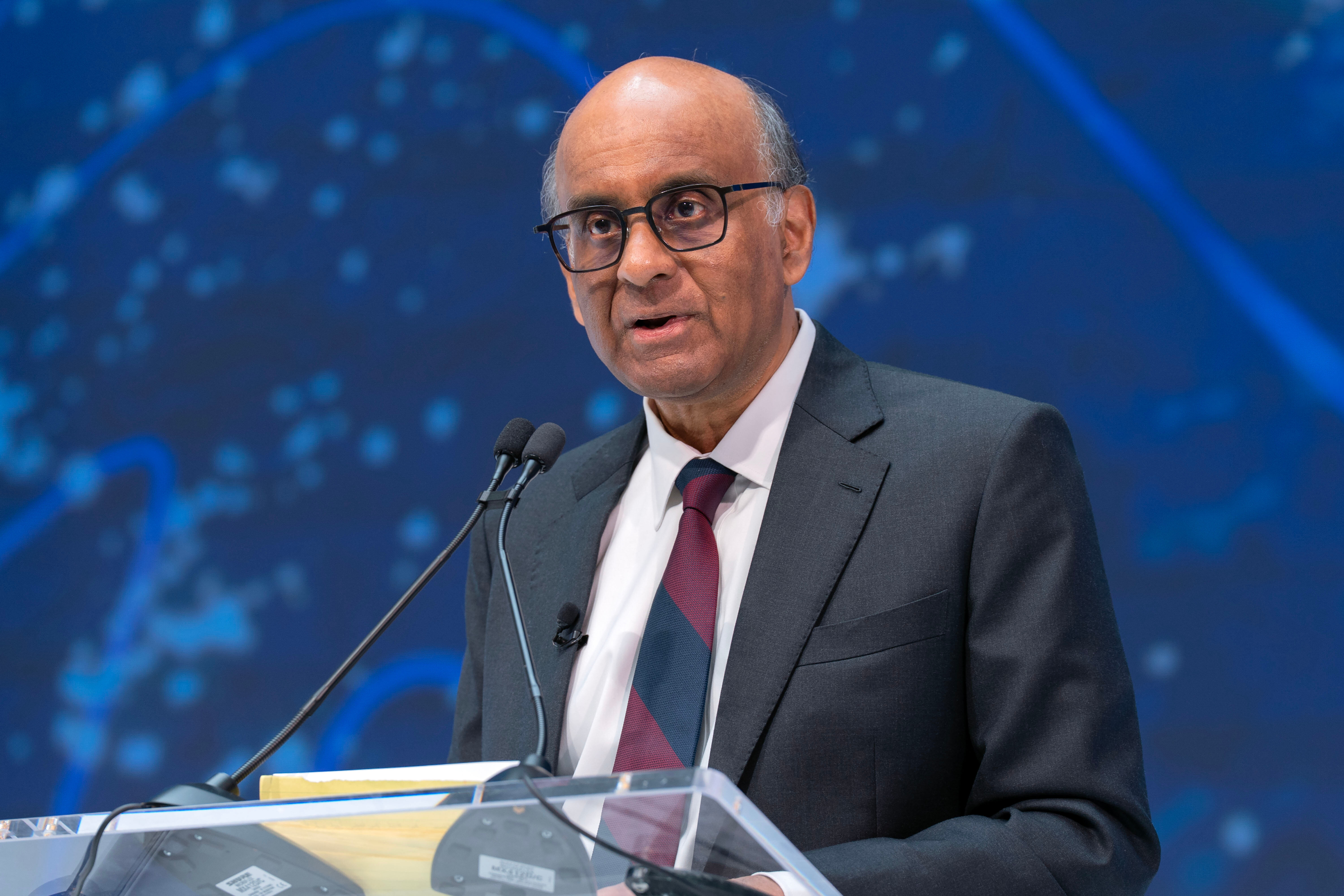
The world's two largest economies can help drive global progress by managing their interactions well, Singaporean President Tharman Shanmugaratnam said on Wednesday at the IMF/World Bank Annual Meetings in Washington.
Amid flaring US-China tensions, marked by fierce exchanges over tariffs, technology restrictions and geopolitical flashpoints, Shanmugaratnam proposed a pragmatic vision for transforming their competition into a shared space of innovation and progress that could benefit the global community.
"There is an alternative perspective that we can borrow from the world of ecology on how the US and China might interact, one that accepts that they will compete vigorously, yet interact dynamically in ways that can be hugely beneficial for both nations and the world," the president said in a lecture.
In ecology, the most dynamic places are not deep within one ecosystem or another, but at the edge where they meet, which ecologists call the ecotone — a zone where species from both ecosystems interact and adapt, and where hybrids flourish and new life-forms emerge.
ALSO READ: Envoy: China and US should be partners helping each other succeed
Applying the ecological metaphor in global affairs, Shanmugaratnam said that China and the United States have two different economic systems, yet "like the edge in nature, the interface between the US and China has been, and can yet be, greatly productive."
As Shanmugaratnam put it in at the beginning of his address, "The challenge of finding a new equilibrium between the US and China is the most worrying fault line in international affairs."
The president warned that it will surely be a "more profoundly dangerous" world if the two powers end up with bifurcation, resulting in a decoupled world in technology, supply chains, financial flows, payment systems and data, and with each developing whole AI ecosystems of their own.
Instead, the president urged both sides to manage interdependence, not sever it.
"The basic point is this: The interaction and competition between the two superpowers is not a threat to be eliminated, but an opportunity to be managed," he said.
ALSO READ: Dialogue and consultation the right course for China-US economic and trade relations
Through trade, investment, joint ventures and two-way technological transfers, as well as "networks of research labs and academic exchanges", both nations could jointly advance progress in health, artificial intelligence and climate technologies, according to Shanmugaratnam.
Breakthroughs in these areas will enable the world to take big ideas and use them to solve its largest problems and drive down costs so that every nation benefits, he added.
"We can see the world's most important and urgent breakthroughs yet," he said, adding that, "there is a yearning among academics and scientists in both the US and China for these exchanges to resume."
He also called on smaller and mid-sized nations to play "intermediary" roles within this global edge — helping stabilize relations and bridge cooperation in innovation and sustainability.
The president seemed to take a pragmatic view of his vision for a "US-China edge," urging policymakers to look beyond short-term tensions and see the long-term stakes.
READ MORE: Wang: China, US should work together for world peace, prosperity
"The prospect may appear distant in today's geopolitical climate, but take the long view — the stakes are high," he said.
If managed wisely, the "US-China edge" could become "a source of prosperity for both nations and the world's greatest engine of innovation."
But he warned that allowing the relationship to unravel would carry grave costs: "If we fail and progressively decouple the systems, there will be no winners."
In his speech, Shanmugaratnam also called for the renewal of multilateralism, including how to re-energize international institutions such as the World Trade Organization and the creation of sensible "guardrails" to govern artificial intelligence.
"The US and China again are key," he said, pointing out that both have "a common interest in ensuring that autonomous warfare does not get out of hand" and that AI systems incorporate "responsibility by design".
The president concluded with an appeal to moral leadership and historical perspective: "History has shown us that at times of crisis and transition, perilous as it may seem, we can forge breakthroughs. This is no time for timidity."
The Singaporean leader's remarks, delivered on the second day of the weeklong annual IMF/World Bank event, echoed a point highlighted by IMF Managing Director Kristalina Georgieva, who has said that international cooperation is driven by "enlightened self-interest", not charity.
For instance, in remarks on Oct 25 last year, Georgieva emphasized that even amid challenging geopolitics, nations can still uphold practical, results-oriented cooperation.
"Countries rally not in idealism or charity but out of enlightened self-interest," the IMF chief said.
On Wednesday, US Treasury Secretary Scott Bessent told reporters the US does not want to decouple with China, but wants to "de-risk" and "diversify" US supply chains.
huanxinzhao@chinadailyusa.com


